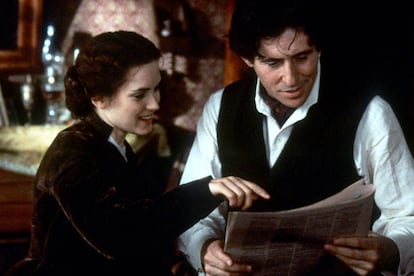An academic has unearthed seven stories and five poems that he attributes to Louisa May Alcott
New research claims that the author of ‘Little Women’ published several works under the pseudonym E. H. Gould

The influence of spiritualism and other pseudosciences on 19th-century literature in the United States prompted Northeastern University professor Max Chapnick to resurrect one of the period’s most admired authors, Louisa May Alcott.
Chapnick argues that the famous author of Little Women, whose character Jo has been a feminist icon for successive generations, wrote over half a dozen stories under the pseudonym E. H. Gould, which were published in a second-rate East Coast newspaper in the second half of the 19th century.
“Alcott was known to have written some pseudoscience stories, and the foreword to an anthology of her short stories mentioned a list of works that she authored, including one, The Phantom, that I couldn’t find,” Chapnick explains over the phone. His doctoral dissertation research (which he has since completed) then took an unexpected turn, the results of which he published in an article in the Journal of Nineteenth-Century Americanists in late October.
Chapnick conducted an exhaustive search of 19th-century East Coast literary publications until he came across a story with the same title as the one listed. It was not attributed to Alcott; it was signed by E. H. Gould, but “it had a lot of Alcott’s attributes,” Chapnick says. The Phantom was inspired by Charles Dickens’s A Christmas Carol; he was an author Alcott admired and knew very well, so much so that she had participated in amateur theatrical performances of some of his works. “It’s a version of that same story, although Alcott’s villain is not just greedy, but he blackmails a woman to try to force her into marrying him because she is poor,” Chapnick explains.
Tracking down other works signed by E. H. Gould led Chapnick to unearth six other stories, five poems and a nonfiction text, published between 1857 and 1860 in The Olive Branch, a Boston publication. Although he has not found any irrefutable proof of his thesis, the works that Chapnick located provided clues that bolstered his suspicion about Gould’s relationship with the author. “In one of the stories, the main character’s last name is Alcott. In addition, the title of the nonfiction text is the name of her childhood home, The Wayside,” he argues.

So far, other academics have not taken Chapnick to task, although he is open to debate and acknowledges that his findings are not uncontested. “I have always believed that the field of literary studies should be open to debate, and that this enriches it,” he says. If Chapnick’s thesis is confirmed, E. H. Gould would not be Alcott’s only known pseudonym. In 1942, two antiquarians, Madeleine Stern and Leona Rostenberg, reviewed Alcott’s papers at Harvard University and discovered that the writer had signed many stories as A. M. Barnard. Stern and Rostenberg suspected that the references to the sensationalist stories written by Little Women’s protagonist, Jo March, actually had to do with the author herself, and they were not wrong.
The following decades saw the rediscovery of a number of Gothic stories featuring crime and melodrama, written under the alias Barnard; they were a far cry from the candid world of the March sisters. Alcott, who died in 1888 at age 55, turned to that dark world in the 1860s, before her successful novel came out in 1868. “E. H. Gould would have been a pseudonym that she used earlier,″ Chapnick posits. His article collects Alcott’s other largely unknown works and some anonymous pieces that he believes Alcott could have written, in order to discuss the common use of pseudonyms in the 19th century and the attribution game that was established with readers to try to determine who had penned the texts.
Chapnick emphasizes that the aliases allowed Alcott to write about issues that interested her, “but which her circle would have considered inappropriate, such as drug use, greed, poverty and gender issues.” The daughter of a well-known abolitionist, the writer was raised in Ralph Waldo Emerson’s transcendentalist circles and his philosophical and literary group. “Alcott had no money, but she had connections, and writing under another name gave her freedom and allowed her to improve her finances,” Chapnick says. The scholar defends the breadth and complexity of the author’s literary legacy. “Alcott has much more to her beyond Jo, such as her nonfiction work when she was a nurse in the Civil War and her travel writing when she was in Europe.”
Sign up for our weekly newsletter to get more English-language news coverage from EL PAÍS USA Edition
Tu suscripción se está usando en otro dispositivo
¿Quieres añadir otro usuario a tu suscripción?
Si continúas leyendo en este dispositivo, no se podrá leer en el otro.
FlechaTu suscripción se está usando en otro dispositivo y solo puedes acceder a EL PAÍS desde un dispositivo a la vez.
Si quieres compartir tu cuenta, cambia tu suscripción a la modalidad Premium, así podrás añadir otro usuario. Cada uno accederá con su propia cuenta de email, lo que os permitirá personalizar vuestra experiencia en EL PAÍS.
¿Tienes una suscripción de empresa? Accede aquí para contratar más cuentas.
En el caso de no saber quién está usando tu cuenta, te recomendamos cambiar tu contraseña aquí.
Si decides continuar compartiendo tu cuenta, este mensaje se mostrará en tu dispositivo y en el de la otra persona que está usando tu cuenta de forma indefinida, afectando a tu experiencia de lectura. Puedes consultar aquí los términos y condiciones de la suscripción digital.









































